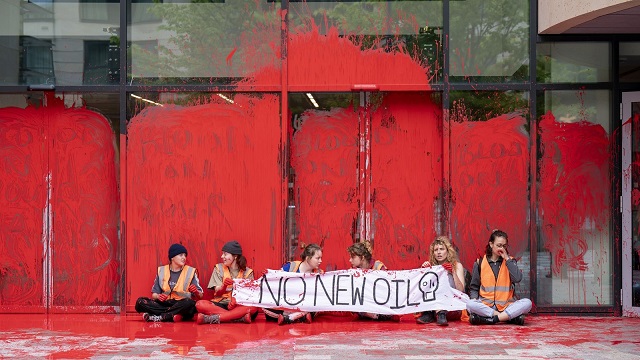
Policing across the country is facing “chronic challenges” due to protests, according to a senior officer from the Metropolitan Police.
Assistant commissioner Matt Twist told a Policy Exchange event the force was dealing with “protests, activism and demonstrations every single day” – with climate campaigners like Extinction Rebellion and large-scale marches over the Israel-Hamas war taking up a huge amount of police resources.
But not only has the cost gone into the tens of millions for policing, there are now claims it is clogging up an already full court system – leading a former Metropolitan Police commissioner to suggest hearings should be taking place 24/7 to address the backlog.
Neither the Ministry of Justice, Home Office or Criminal Prosecution Service were able to provide Sky News with exact figures on the number of arrests, charges and completed trials linked to protests – despite numerous claims by ministers about the delays protesters and “leftie lawyers” are causing.
But analysis from the Criminal Bar Association said there was a backlog of 2,603 public order offences at the end of September 2023 – a rise of 130% in five years from a low of just 1,129 at the end of June 2018.
The Met Police also confirmed 36 people had been charged following pro-Palestine demos in recent months, along with 338 charges of Just Stop Oil activists in 2023 alone, so there will be more cases heading to the courts.
The government passed the Public Order Act 2023 last year, which increased the police’s ability to restrict demonstrations and introduced a number of new criminal offences relating to protests – powers that have been used by the Met Police to make more arrests.
But cuts meant the budget for the Ministry of Justice (MoJ) in 2019-20 was around 25% lower in real terms than it was in 2010-11.
Add that to the courts closing for months over the pandemic, along with recent strikes by barristers over pay, and a drop in spending on the system of 8.6% in the most recent government figures, keeping up with cases of all kinds is becoming increasingly difficult.
After the 2011 riots, the head of public prosecutions, the now Labour leader Sir Keir Starmer, ordered courts to sit 24/7 to tackle the huge number of cases amounting from the disturbance, saying it played a part in “bringing the situation back under control”.
A total of 2,138 people – or 69% of the 3,103 who appeared in court related to the disorder – were found guilty within five days of the riots breaking out.
Now a former commissioner of the Met, Lord Hogan-Howe, has suggested the measure could be reintroduced to clear the likes of XR and pro-Palestinian protesters from the courts, allowing the system to get back on its feet, but also sending a “signal” to protesters about the consequences of their actions.
The peer, who took over the force in the weeks after the riots and ran it until 2017, said: “After the 2011 riots, we saw the courts sitting 24 hours. It sent a signal.
“I’ve never seen them sit on a weekend since. And yet we have got 18-month delays in the court system. That’s not acceptable. Delayed justice is denied justice.
“I think the courts system has got to be looked at. In the succeeding 18 months after the 2011 riots, we arrested 5,600 people. It took 800 officers to look at a quarter of a million hours of CCTV footage – 70 odd per cent of them were charged, 90 odd per cent pleaded guilty.
“The system can work when we get our act together.”
So should judges be sitting overnight and at weekends to clear the system of the growing number of cases coming from protests?
‘Courts in chaos’
Ministers at the time of the 2011 riots agreed with Lord Hogan-Howe that courts were a “powerful symbol” that allowed the system to “deal with a high volume of cases in a short space of time and ensure police could clear police cells”.
But in evidence to the Home Affairs Committee, they said that while the idea would remain “part of contingency planning”, it was “not likely to be a sensible or cost-effective way of operating in normal circumstances”.
However, the courts system is not operating under “normal circumstances” now.
A mixture of COVID, strikes and underfunding has seen the backlog across all types of cases in crown courts hit 66,000 – up from around 40,000 before the pandemic.
The chief executive of charity Victim Support, Katie Kempen, told Sky News the delays could have a “devastating impact” on victims of crime, causing emotional trauma and preventing them from moving on with their lives” – particularly survivors of sexual violence.
“Our caseworkers are supporting people who have been waiting upwards of five years for trial, with many having their cases adjourned four or five times,” she said.
“However, this issue affects victims of all crimes. We hear every day from people across the board facing excruciatingly long waits for trials, some of whom are simply dropping out altogether and not getting the justice they deserve.
“This situation is simply unacceptable. The government must invest to ensure the criminal justice system can work at speed to clear this backlog.”
But is prioritising protest cases the right way to go when the problem in court backlogs is so much wider?
Prominent KC and chair of the Criminal Bar Association, Tana Adkin, told Sky News: “The principle that you deal with people as quickly as possible and get them out on bail [and] you set conditions so they don’t go back onto the M25 and glue themselves to the road, the principle is fine.
“But why should they have that while everyone else in the criminal justice system doesn’t?”
She also questioned the overall impact of protest cases on the courts, adding: “If you are putting pressure on a system that is already on its knees, it is obviously going to show up more clearly.
“Our system should be perfectly able to deal with protesters as we have in the past. We have always had protests and the courts have always managed it.
“I think when you are in strained times and you are dealing with a system that is, as I say, on its knees, that’s when it is going to show up.”
‘Bring it on’
Sarah Lunnon, a co-founder of Just Stop Oil who is currently awaiting trial for slow marching, said delays in court appearances had some shocking effects on the defendants.
The former Green Party councillor, who is also a supporter of Extinction Rebellion, told Sky News: “It does have an effect on your life, of course it does, because there is an uncertainty moving forward, you don’t know what is going to happen.
“You don’t know what the financial penalties are going to be, you don’t know if when you get called to court if you are going to lose your liberty, if you are going to end up in prison for a certain amount of time. So there is an impact on people’s lives of having court cases hanging over you.”
Ms Lunnon said one protester took his own life last year due to the “huge mental impact” of waiting for a crown court trial.
“He was on a tag,” she said. “A lot of people who have crown court cases, they get released on bail but they get released on tag, which is basically a form of home imprisonment.
“If you are on them for long, long periods of time, it weighs on people and impacts their lives.”
However, while she was keen for the court process to be sped up, she rejected Lord Hogan-Howe’s idea that it would change their tactics.
“As Just Stop Oil, our position is we are prepared to face the consequences of our actions,” said Ms Lunnon. “That’s why people don’t resist arrest and that is why we are absolutely accountable for our actions. When we act, we stay there and we are arrested and we turn up for trial.
“So 24/7 courts are not going to stop Just Stop Oil supporters taking action at all. It is like, bring it on. We are very happy to face the judicial system and point out the failures in the judicial system and put our case to the jury.
“We are absolutely prepared to face the consequences of our actions.”
‘Impossible’
There is a more practical element that could cause a headache for Lord Hogan-Howe’s suggestion – running the actual courts.
CBA chair Ms Adkin KC called the 24/7 idea “almost laughable” due to “decades and decades of underfunding” in the criminal justice system.
Figures released by the CBA in 2022 showed 22% of barristers had left the profession since 2016 in protest at low pay for legal aid cases and a crumbling system as money-saving measures took their toll.
“The whole shape of things has completely changed since 2011,” she told Sky News. “Back then we had a lot more barristers than we do now. We’re down to about 2,500 from 4,000 or 5,000 – at one stage we had 6,000 barristers.
“But now we don’t have enough people to do 24/7 courts, it would be impossible… asking people with families, people that are already on their knees, that we want even more from them.”
And it isn’t just about the barristers and the judges, the KC said. “It is the court staff, it’s security staff, it is everybody being expected to do longer and longer hours for no extra pay or reward.
“And because we have been beaten down for so long, all you would do is be driving more people away.”
She added: “It is not about playing a game of chess. It is about investing in human beings.”
‘Fairness at 4am?’
A former Extinction Rebellion member and spokesman, Rupert Read, also questioned whether there would be a wider impact on justice being served.
Mr Read, who now runs the Climate Majority Project – a campaign group which doesn’t engage in direct action – told Sky News: “It’s not really good for anybody to have very long delays before they go to court.
“But on the other hand, I also think it is almost certainly not good for the vast majority of people in the court system – including the defendant and the police – to have to be trying to do serious, judicial business at four o’clock in the morning.”
Pointing to the so-called “hungry judges” research that claimed tougher sentences were doled at particular times of day – mainly when they were furthest away from their last meal – Mr Read said longer sittings would not “conceivably be conducive to best practice”.
He added: “Has anyone researched what difference it makes when you get people in court in the middle of the night and whether people are more or less likely to be rational, cool-headed, fair etc at four o’clock in the morning?
“I don’t know what the answer to that is but I would be willing to make a strong bet you are going to have a deteriorated quality of justice if you’re sitting at three, four, five, six o’clock in the morning.”
A source at the MoJ told Sky News that senior judiciary have annually reviewed a protocol to run overnight courts, if ever needed, but said that across the legal profession, it was widely considered that they should not be relied on “unless absolutely necessary”.
An official MoJ spokesperson said: “Magistrates’ courts already have the flexibility to hear cases outside of usual working hours and – as a direct result of our decisive action to speed up justice for victims – more criminal cases are also coming through the crown court than at any point over the last two years.”
Source: ![]() news.sky.com
news.sky.com

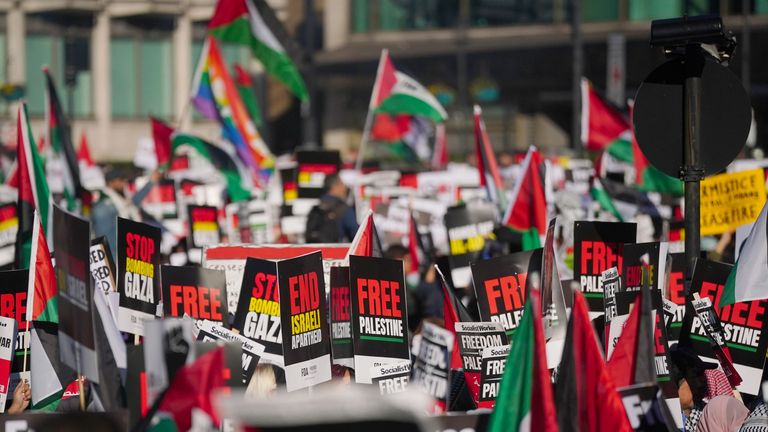
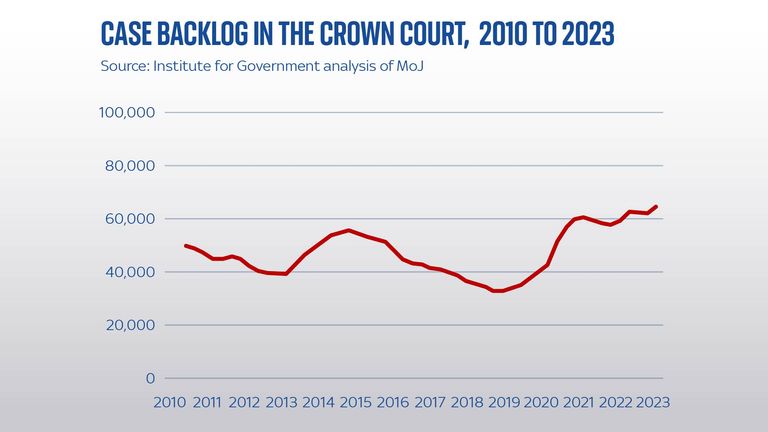
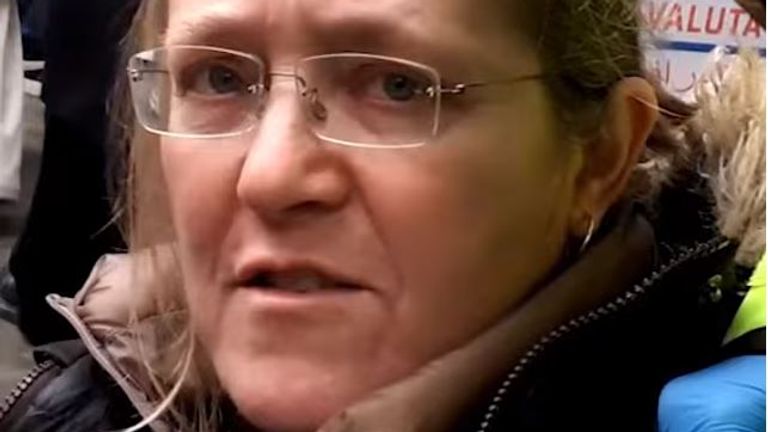



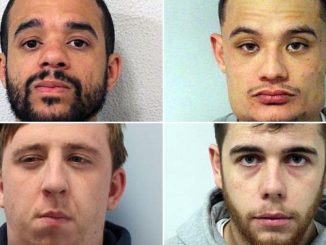

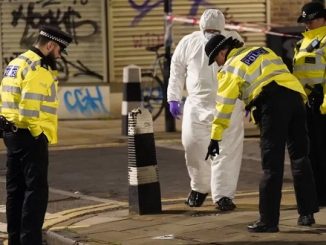
Be the first to comment